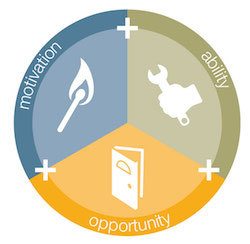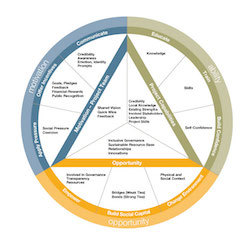How can companies help change people’s behaviour in order to benefit society?
Organizations have the resources and market influence to effect positive change. Through product labeling, supply chain management, cause marketing, corporate philanthropy, employee volunteerism and NGO (non-government organization) partnerships, companies are helping society get active, eat healthy foods, dispose of products properly, use less energy and generally live more sustainable lives.
This new report reveals the three conditions necessary for changing people’s behaviour that create benefits for society. The report also includes 19 mechanisms companies can use to motivate people to change and to create the capabilities and opportunities for change.
Social Change, Collective Benefits
The review studied social change in multiple areas: behaviour changes related to the environment, health, civic engagement, and social and economic inclusion; behaviour changes made by individuals and groups, private citizens and employees; and change projects driven by for-profit business as well as social enterprises and governments. The positive behaviour change ranged from simple actions, or shallow change, to major lifestyle changes—deep change.
While the majority of the examples in this report focus on behaviour changes made by the general public, social change can also happen within organizations.
Types of Social Change
The review studied social change in multiple areas: behaviour changes related to the environment, health, civic engagement, and social and economic inclusion; behaviour changes made by individuals and groups, private citizens and employees; and change projects driven by for-profit business as well as social enterprises and governments. The positive behaviour change ranged from simple actions, or shallow change, to major lifestyle changes—deep change.
While the majority of the examples in this report focus on behaviour changes made by the general public, social change can also happen within organizations.
Social Change: A Game Changer
Forward-thinking business leaders see the economic benefits of driving social innovation. In addition to strengthening their organization’s reputation, social change projects can increase a company’s pool of prospective customers or employees.
Researchers agree that investing in social change makes good business sense. In a 2002 Harvard Business Review article, management experts Michael Porter and Mark Kramer described the business value of corporate philanthropy: “Corporations can use their charitable efforts to improve their competitive context—the quality of the business environment—where they operate. Using philanthropy to enhance context brings social and economic goals into alignment and improves a company’s long-term business prospects.”
Three Conditions Necessary for Behaviour Change
The research team found three conditions are necessary for people to change their behaviour:
-
Motivation: People must have a reason to change.
-
Ability: They must have the skills, confidence and knowledge required to change.
-
Opportunity: They must have the resources, relationships and environmental conditions needed to change.
All three conditions must be met for people to change their behaviour.

These three conditions are the basis for 19 mechanisms companies can use to motivate people and give them the ability and opportunity to change.
Tools & Best Practices for Business-Driven Social Change
The report includes examples of tools and techniques companies can use to apply the 19 behaviour change mechanisms; specific examples of behaviour change projects are in the complete systematic review. The report also illustrates 13 best practices for managing change projects.
These behaviour changes and best practices culminate in the Social Change Framework:

What’s Included in the Report
Based on 123 leading academic and industry sources from 1992 to 2012, the report:
-
reveals the three conditions necessary for changing people’s behaviour.
-
provides 19 mechanisms companies can use to drive positive behaviour change, and a checklist for managing change projects.
-
includes case studies from two organizations that have led social change projects: Tim Hortons and LoyaltyOne.
While many of the examples in this report come from the non-profit and public sectors, business leaders in every sector can apply these practices to the social change projects they initiate.
Who Should Read This Report
Directors of philanthropy, community relations, corporate citizenship, and corporate social responsibility (CSR) can use this report to influence people’s behaviour in a way that benefits society and the environment.
Social entrepreneurs and non-profit leaders can use this report to foster goodwill, develop new markets, and even new industries. Ultimately, anyone who wants to lead social innovation can use this report to trigger positive changes in people’s behaviour.



Add a Comment
This site uses User Verification plugin to reduce spam. See how your comment data is processed.This site uses User Verification plugin to reduce spam. See how your comment data is processed.